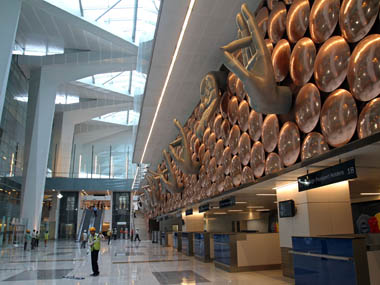New Delhi: So will flying out of Delhi International Airport (DIAL) become even more expensive for airlines as well as passengers?
GMR Infrastructure, leader of the consortium which operates the Delhi International Airport Ltd (DIAL), has approached the Airport Economic Appellate Tribunal objecting to several decisions taken by the Airports Economic Regulatory Authority (AERA). Last month, AERA had allowed only about half the tariff increase (345 percent) that GMR had asked for and the appeal at the Appellate Tribunal now seeks to obtain the remaining half of the increase by pointing out alleged flaws in AERA’s decision and methods of calculation.
[caption id=“attachment_357959” align=“alignleft” width=“380” caption=“GMR has invested close to Rs 13,000 crore and has developed a total of 5.5 million square feet at DIAL. AFP”]
 [/caption]
[/caption]
GMR has invested close to Rs 13,000 crore and has developed a total of 5.5 million square feet at DIAL. DIAL posted a net loss of Rs 231 crore for the fourth quarter ended 31 March 2012, compared to a loss of Rs 115 crore in the year-ago quarter. Net revenues moved up marginally to Rs 2,024 crore.
It is now seeking revision in aeronautical charges- charges airlines pay to land and park aircraft and for navigation services. Already, after AERA allowed GMR a 345 percent increase in tariffs from 15 May, the airport developer has been charging Rs 196 per domestic passenger and Rs 436 per international passenger as User Development Fees (UDF).
The UDF was in addition to the hike in aeronautical charges which GMR levied on all airlines, prompting them to brand Delhi the world’s most expensive airport to operate from. GMR’s latest move will sure make operations from Delhi Airport even more expensive for airlines but it yet not clear if this would also burden passengers further.
Impact Shorts
More ShortsA GMR spokesperson merely confirmed that the company has filed an appeal at the Appellate Tribunal but declined to provide further details. But a company official explained on condition of anonymity that AERA’s earlier decision was riddled with problems.
To begin with, AERA has awarded zero rate of return for the refundable security deposits GMR raised by leasing land. “This means the weighted cost of capital has gone down. Let’s say GMR used Rs 1,300 crore for modernisation of the airport project. The part which has been funded through security deposits won’t be included in the airport project’s cost of capital whereas other funding sources such as equity and debt are included”. The official also pointed out that AERA has awarded 16 percent ROR (rate of return) to equity infusion when GMR asked for 24 percent and the government recommended 20.5 percent.
AERA had floated a consultation paper last year for determining aeronautical charges for Delhi Airport. DIAL officials had said earlier that if AERA were to permit only 345-350 percent hike in airport charges, this would belie their expectations, especially in view of the mandate in the concession agreement for a “reasonable return” on investment and the huge capital expenditure incurred. Airport charges have not been revised for the last 10 years, except for a 10 per cent hike in 2010.
In a statement after the UDF was allowed in May, GMR had said that Delhi airport will compare favourably to other major global airports where passenger fees range between $ 25 (Rs 1,300) to $30 (Rs 1,560) on an average, thus making a very soft impact on passengers.
It had also said that aero tariffs (landing, parking and navigation charges) levied in Delhi are amongst the lowest in the world. “Considering additional investments done as per the terms of the concession, including capacity building and new features…the tariff hike effective from 15 May 2012 is less than half of requested increase and is therefore inadequate. DIAL is making losses due to delay in revision of aeronautical charges and significant airline over dues.”
)